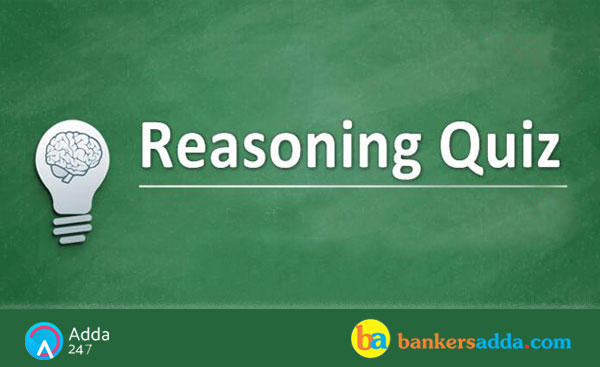Dear Aspirants,

Reasoning Questions for IBPS RRB 2018
Reasoning Ability is an onerous section. With the increasing complexity of questions, it becomes hard for one to give it the cold shoulder. The only way to make the grade in this particular section in the forthcoming banking exams like IBPS RRB is to practice continuously with all your heart and soul. And, to let you practice with the best of the latest pattern questions, here is the Adda247 Reasoning Quiz based on the study plan and the exact same pattern of questions that are being asked in the exams.
Directions (1-5): The following questions are based on the five three digits numbers given below:
312 539 827 461 870
Q1. If in each number, all the three digits are arranged in descending order within the number, which of the following will be the fourth highest number?
(a) 539
(b) 870
(c) 827
(d) 312
(e) 461
Q2. If first digit is placed in second digit, second digit is placed in third digit and third digit is placed in first digit in each number, then which number will be lowest?
(a) 461
(b) 312
(c) 870
(d) 539
(e) 827
Q3. If the position of first and third digits of the numbers are interchanged of each number then how many numbers thus formed will be completely divisible by 2?
(a) None
(b) Three
(c) More than three
(d) One
(e) Two
Q4. What will be result if first digit of second highest number is divided by first digit of second lowest number?
(a) 4
(b) 5
(c) 7
(d) 2
(e) 1
Q5. If in each number, both first and second digits are added and then third digit will be subtracted from that addition then what will be the highest resultant?
(a) 3
(b) 2
(c) 9
(d) 10
(e) 15
Directions (6-10): The following questions are based on the five three digits numbers given below:
513 214 956 784 387
Q6. If in each number, all the three digits are arranged in ascending order within the number, which of the following will be the second lowest number after rearrangement?
(a) 387
(b) 784
(c) None of these
(d) 956
(e) 513
Q7. If second digit will be interchanged with third digit in each number, then which number will be the second highest number after rearrangement?
(a) 784
(b) 956
(c) 387
(d) None of these
(e) 214
Q8. If in each number, both first and third digits are added and after that second digit is subtracted from that addition then how many numbers are greater than 5 after mentioned operation?
(a) One
(b) Two
(c) Three
(d) Four
(e) None of these
Q9. If in each number, all the odd digit is subtracted by 1 and all even digit is added by 1 then, which of the following will be the lowest number after mentioned operation?
(a) 784
(b) 513
(c) 387
(d) 956
(e) None of these
Q10. If 1 is subtracted from first digit and 2 is added in last digit of each number then which number will be the 4th lowest number after mentioned operation?
(a) 784
(b) 513
(c) 214
(d) 956
(e) None of these
Directions (11-15): These questions are based on the following six numbers.
387 876 176 285 721 937
Q11. In each number, when we added 1 to each odd digit and 2 is subtracted from each even digit, then which number will be lowest?
(a) 387
(b) 876
(c) 176
(d) 285
(e) None of these
Q12. If all the digits of each number are arranged in ascending order within the number then which number among them will be third highest?
(a) 387
(b) 937
(c) 176
(d) 285
(e) None of these
Q13. If the first two digits of each number are interchanged, which among these numbers will be the highest number?
(a) 721
(b) 876
(c) 937
(d) 387
(e) None of these
Q14. In each number, if we subtract 1 from the first digit, then which among these number will be 2nd lowest number?
(a) 721
(b) 876
(c) 937
(d) 285
(e) None of these
Q15. In each number, if we added first and 2nd digit and after addition, subtracted 3rd digit, then the resultant of how many numbers will be more than 5?
(a) None
(b) One
(c) Two
(d) Three
(e) None of these


 Quantitative Aptitude Quiz For Bank Foun...
Quantitative Aptitude Quiz For Bank Foun...
 Reasoning Quiz For Bank Foundation 2024 ...
Reasoning Quiz For Bank Foundation 2024 ...



